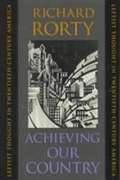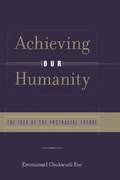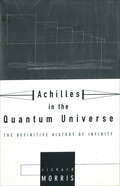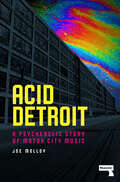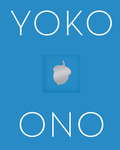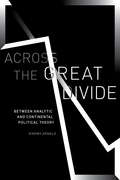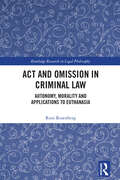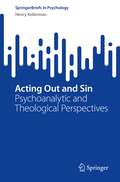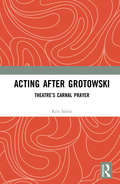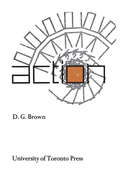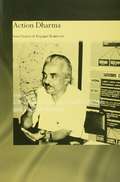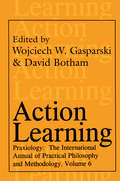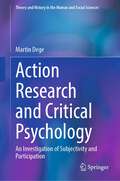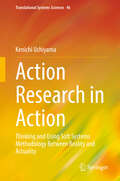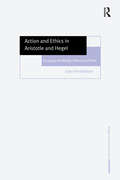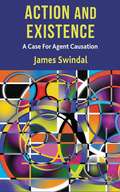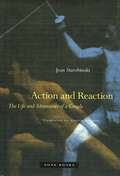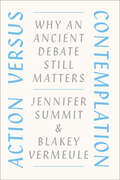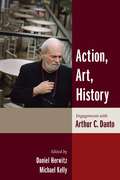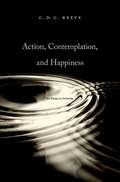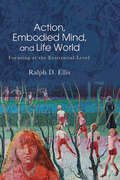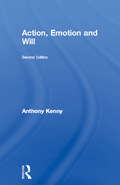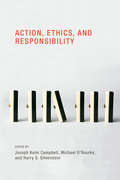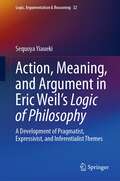- Table View
- List View
Achieving Our Country: Leftist Thought in Twentieth-Century America
by Richard RortyMust the sins of America's past poison its hope for the future? Lately the American Left, withdrawing into the ivied halls of academe to rue the nation's shame, has answered yes in both word and deed. In Achieving Our Country, one of America's foremost philosophers challenges this lost generation of the Left to understand the role it might play in the great tradition of democratic intellectual labor that started with writers like Walt Whitman and John Dewey. How have national pride and American patriotism come to seem an endorsement of atrocities--from slavery to the slaughter of Native Americans, from the rape of ancient forests to the Vietnam War? Achieving Our Country traces the sources of this debilitating mentality of shame in the Left, as well as the harm it does to its proponents and to the country. At the center of this history is the conflict between the Old Left and the New that arose during the Vietnam War era. Richard Rorty describes how the paradoxical victory of the antiwar movement, ushering in the Nixon years, encouraged a disillusioned generation of intellectuals to pursue "High Theory" at the expense of considering the place of ideas in our common life. In this turn to theory, Rorty sees a retreat from the secularism and pragmatism championed by Dewey and Whitman, and he decries the tendency of the heirs of the New Left to theorize about the United States from a distance instead of participating in the civic work of shaping our national future. In the absence of a vibrant, active Left, the views of intellectuals on the American Right have come to dominate the public sphere. This galvanizing book, adapted from Rorty's Massey Lectures of 1997, takes the first step toward redressing the imbalance in American cultural life by rallying those on the Left to the civic engagement and inspiration needed for "achieving our country."
Achieving Our Humanity: The Idea of the Postracial Future
by Emmanuel C. EzeAchieving Our Humanity explores a postracial future through a philosophical analysis of the social, cultural, economic and political experiences of race in the past and what this might mean for our present and, most importantly, our future.
Achilles in the Quantum Universe: The Definitive History of Infinity
by Richard MorrisCenturies ago, when the ancient philosopher Zeno proposedhis famous paradox involving Achilles and the Tortoise, he struck at the heart of one of science's most enduring and intractable problems: How do we define the infinite? From then on, our greatest natural philosophers, logicians, mathematicians, and scientists, from Aristotle to Stephen Hawking, have been stymied-and driven-by infinity.Acclaimed Science writer Richard Morris guides us on a fascinating, literate and entertaining tour of the efforts made throughout history to make sense of the mind-bending concept of the infinite. In tracing this quest, Morris shows us how each new encounter with infinity drove the advancement of physics and mathematics. Along the way, we encounter such luminaries as Galileo and Newton, Tycho Brahe and Giordano Bruno, and the giants of modern physics: Planck, Einstein, Bohr, Feynmann, Hawking, and numerous others.Beginning with simple logical puzzles and progressing to the latest cosmological theories, Morris shows how these same infinity problems helped spawn such groundbreaking scientific developments as relativity and quantum mechanics. Though in many ways, the infinite is just as baffling today as it was in antiquity, contemporary scientists are probing ever deeper into the nature of our universe and catching fleeting glimpses of the infinite in ways the ancients could never have imagined.Ultimately, we see that hidden within the theoretical possibility of an infinite number of universes may lie the answers to some of humankind's most fundamental questions: Why is there something rather than nothing? Why are we here?
Acid Detroit: A Psychedelic Story of Motor City Music
by Joe MolloyAcid Detroit tells the story of Motor City through its revolutionary music past and present, in order to find the seeds of radical transformation among its ruins.Acid Detroit is an exhilarating, technicolour view of Detroit&’s musical and social history from the 1960s to the present day. Redefining the counterculture as a time of Acid Communism, Acid Detroit diverges from most books on the Sixties, which centre on California, to show that Detroit was an unequalled hotbed of radical activism, urban unrest and sonic innovation. Considering Detroit's unique mix of people and cultures and enduring sonic legacies, it covers everything from incendiary garage rock, to European-influenced techno and experimental hip-hop crews, intertwining the artist&’s lives and works with the city&’s rise and decline, from its establishment as an industrial powerhouse to the high point of Motor City, into its decline and tentative rebirth. A mind-expanding tour through time and space that explores the lost possibilities, histories and hidden potentials of the city, Acid Detroit reveals a history of resilience and transformation hidden in the shadows of the abandoned factories and warehouses of the Motor City.
Acorn
by Yoko Ono"It's nearly 50 years ago that my book of conceptual instructions Grapefruit was first published. In these pages I'm picking up where I left off. After each day of sharing the instructions you should feel free to question, discuss, and/or report what your mind tells you. I'm just planting the seeds. Have fun." - Yoko OnoLegendary avant-garde icon Yoko Ono has inspired generations of artists and performers. In Acorn, she offers enchanting and thought-provoking exercises that open our eyes-and all of our senses - to more creative and mindful ways of relating to ourselves, each other, and the planet we cohabit. Throughout this beautifully designed book are 100 black-and-white line drawings by Yoko. Like this legendary woman herself, the book is wildly original, stimulating, and hard to label: call it purposeful play, call it brain poetry, call it guided motivation, call it Zen-like incantations, call it whatever you want. But read it. Acorn may change the way you experience the world.
Across the Great Divide: Between Analytic and Continental Political Theory
by Jeremy ArnoldThe division between analytic and continental political theory remains as sharp as it is wide, rendering basic problems seemingly intractable. Across the Great Divide offers an accessible and compelling account of how this split has shaped the field of political philosophy and suggests means of addressing it. Rather than advocating a synthesis of these philosophical modes, author Jeremy Arnold argues for aporetic cross-tradition theorizing: bringing together both traditions in order to show how each is at once necessary and limited. Across the Great Divide engages with a range of fundamental political concepts and theorists—from state legitimacy and violence in the work of Stanley Cavell, to personal freedom and its civic institutionalization in Philip Pettit and Hannah Arendt, and justice in John Rawls and Jacques Derrida—not only illustrating the shortcomings of theoretical synthesis but also demonstrating a productive alternative. By outlining the failings of "political realism" as a synthetic cross-tradition approach to political theory and by modeling an aporetic mode of engagement, Arnold shows how we can better understand and address the pressing political issues of civil freedom and state justice today.
Act and Omission in Criminal Law: Autonomy, Morality and Applications to Euthanasia (Routledge Research in Legal Philosophy)
by Roni RosenbergThis book offers an innovative perspective on the critical distinction between acts and omissions in criminal law, a distinction that runs like a defining thread through all types of criminal offenses.While any act that positively causes a prohibited harm is sufficient for a conviction, an omission that causes the very same harm warrants a conviction only when there is a legal duty to act. This fundamental distinction between acts and omissions is not just relevant to criminal law, but it is also deeply rooted in our moral thinking. Thus, it is commonly argued that the difference between acts and omissions is also applicable to the intuitive moral distinction between active euthanasia, forbidden in most countries, and passive euthanasia, permitted in many countries under certain circumstances. Hence, the significance of this book is threefold: First, it offers a comprehensive, coherent, and systematic discussion of the intersections between the philosophical-moral and the legal-criminal aspects of this fundamental topic. Second, it offers a novel rationale for the distinction between acts and omissions, based on the principle of autonomy. Finally, it demonstrates the influences of the theoretical discussion, on the most significant practical questions.This book will be of interest to researchers, academics and policy-makers working in the areas of criminal law, moral philosophy, and bioethics.
Acting Out and Sin: Psychoanalytic and Theological Perspectives (SpringerBriefs in Psychology)
by Henry KellermanThis brief treatise explores the common threads to psychoanalytic thought and theological theory. It uses a psychoanalytic lens to examine Judeo/Christian concepts of individual will, consciousness and the unconscious, and the apparent confounding idea of sin. What is new is that the definition of sin is revealed as a psychoanalytic translation of acting-out. Focusing on the behavior of acting-out it illuminates ideas that are part of Western cultural tradition providing insights to those interested in the psychology, and its history and philosophy. As such, it is a highly relevant work for psychologists, psychiatrists, and psychoanalysts, as well as for a comparative study of psychoanalytic and theological intersecting structures.
Acting after Grotowski: Theatre’s Carnal Prayer
by Kris SalataFor whom does the actor perform? To answer this foundational question of the actor’s art, Grotowski scholar Kris Salata explores acting as a self-revelatory action, introduces Grotowski’s concept of "carnal prayer," and develops an interdisciplinary theory of acting and spectating. Acting after Grotowski: Theatre’s Carnal Prayer attempts to overcome the religious/secular binary by treating "prayer" as a pre-religious, originary deed, and ultimately situates theatre along with ritual in their shared territory of play. Grounded in theatre practice, Salata’s narrative moves through postmodern philosophy, critical theory, theatre, performance, ritual, and religious studies, concluding that the fundamental structure of prayer, which underpins the actor’s deed, can be found in any self-revelatory creative act.
Action
by D. G. BrownProfessor Brown in this volume discusses one of the most difficult questions in metaphysics, "what is action?" His analysis proceeds along three main lines of thought: the point of view of the agent, the primacy of inanimate action, and the pervasiveness of explanatory insight in the description of action. In the spirit of recent work on practical reasoning, he takes the central fact about human action to be the existence of the point of view, and considers the agent's relation to his own body, Professor Brown argues that the concept of human action is best understood through that of inanimate action, such as the action of wind on trees or an axe on wood. His analysis takes inanimate action as fundamental, and defends it against the popular theory that it is an anthropomorphic projection. Human action is indeed unique. But it is also Professor Brown's thesis that the classical empiricist search for the brute fact of our own agency yields no more than incidental insights into its nature; introspection does not replace the analysis of human action.The analysis in this essay caters for inanimate action as well as for the uniqueness of human action. The key to an analysis complex enough to cover both is the notion of "attributability," which Professor Brown regards as providing "an Aristotelian extension of a Humean approach to causation." Explanation by reference to the soul exploits the point of view of the rational agent. In this way, both human and inanimate action are exhibited as natural phenomena the descriptions of which are pervaded by explanatory insight.The book as a whole gives an account of action in which the peculiarities of human action find their place in nature. It does not enter on questions of ethics, but remains with concepts common to morality, psychology, and history. There are incidental discussions of deliberation, psychokinesis, casual necessity, the agent's knowledge of his action, and responsibility. Here is a controversial theory of action supported by careful argument. Professor Brown's writing is both ambitious in scope and attentive to conceptual detail, and offers a valuable contribution to one of the liveliest contemporary debates in philosophy.
Action Dharma: New Studies in Engaged Buddhism (Routledge Critical Studies In Buddhism Ser. #Vol. 23)
by Christopher QueenAction Dharma charts the emergence of a new chapter in an ancient faith - the rise of social service and political activism in Buddhist Asia and the West. Fourteen new essays treat the historical origins, global range, teachings and practices, and leaders and organizations that make up the latest turning of the Dharma. Environmentalism and peace wa
Action Learning: Praxiology (Praxiology Ser. #Vol. 6)
by Wojciech W. GasparskiPraxiology is the study of working and doing from the point of view of effectiveness. It has three components: analysis of concepts involving purposive actions; critique of modes of action from the viewpoint of efficiency; and normative advisory aspects in recommen-dations for increasing human efficacy. This sixth volume of the Praxiology series fo-cuses on action learning. Learning from distinguishable action is surprisingly different than learning from a sub-ject expert in human or book form. For those who have worked with and in action learn-ing, the latest form is always distinguishably different from a former experience. Action learning programs are not, in general, intended to tackle puzzles, namely, questions to which an answer may be said to exist even if that answer is difficult to find; action learn-ing is intended to help to develop the ability to tackle problems or opportunities, of which different persons, all experienced, intelligent, and motivated, might well advocate differ-ent courses of action, all reasonable. The essentials of action learning, according to this volume, are: there can be no learning unless the participant receives feedback about his/her performance; partici-pants learn only of their own volition and never at the will of others; the volition to learn is most readily engendered by the lure of success or by the fear of calamity. Building upon these essentials, the authors view action learning as a process of inquiry begin-ning with the experience of not knowing what to do next, and finding that an answer is not available from current expertise. All chapters in this volume are sound contributions to the continuing debate on the processes of learning from distinguishable action. Action Learning is intriguing reading for sociologists, philosophers, managers, and research-ers of all disciplines.
Action Research and Critical Psychology: An Investigation of Subjectivity and Participation (Theory and History in the Human and Social Sciences)
by Martin DegeThis book examines the theoretical developments in the field of Action Research from a historical perspective. The central focus of the investigation is the concepts of democracy and subjectivity as defined by the field’s various traditions. To address this issue, this book offers a thorough investigation of the theoretical and historical underpinnings of Action Research in order to argue that such a clarification allows for a transcendence of the distinction between theory and practice in political action. This transcendence will be achieved with the theories of the German critical psychologist Klaus Holzkamp and his interpretation of subjectivity and democracy. Holzkamp establishes a comprehensive mode of change based on the contradiction of existing possibilities for action and restrictions in a concretely given empirical situation. This book is aimed at History of Psychology Classes, Social Workers, Activism Researchers, Undergraduate Courses in Critical Thinking and Political Action, and Decolonial Theory in Psychology.
Action Research in Action: Thinking and Using Soft Systems Methodology Between Reality and Actuality (Translational Systems Sciences #46)
by Kenichi UchiyamaThis is the first book to provide the fundamental backbone for the field of action research (AR). One of the main characteristics of AR is to achieve a kind of learning based on experience through action in the real world, connecting and reconciling theory and practice by reflection for / in / by action. A standard form of AR has not yet been found, however, because it is difficult for conventional academicians to effectively bridge the gap between objectivity in theory and subjectivity in practice. For the past 50 years, soft systems methodology (SSM) has developed the methodology to deal with subjectivity by rigorously adhering to a coherent guideline of a systemic means for discussion— for example, accommodation (i.e., living with different individual worldviews). The author began to reinterpret SSM from an Eastern context at Lancaster University (UK), and received a Ph.D. at the London School of Economics, introducing the &“actuality&” point of view. This idea originated with the eminent Japanese psychiatrist Bin Kimura, who argued that schizophrenics do not lose touch with reality but with actuality. That is, there are two aspects of the world, reality and actuality, based on Latin res (&“thing&”) and actio (&“action&”). They can recognize all things of the world as &“reality&” as expressed by that noun but cannot comprehend with a feeling of reality the predicate &“actuality&”. Introducing actuality into SSM as a new dimension opened a new perspective in SSM both theoretically and practically. This topic is discussed in detail in Part II of this book. Part I contains three chapters. Chapter 1 provides a basic conceptual overview of SSM. Chapter 2 provides an actual trace of the evolution of SSM over the last 25 years. One topic that is expected to become the subject of serious practical application of SSM in the future is its application to resilience. This is discussed in some detail in Chapter 3. The actuality aspect of SSM has been used for more than 20 years in various contexts, yielding many good results. Among those are a new explanation of accommodation using paleo logic or predicate logic; a new management cycle based on actuality, such as learning for / in / by action; and the novelty of the methodological tool itself. Those 20 years of learning authenticate the guideline for the way of discussion or agreement that is relevant to actuality. Especially in the recent Covid-19 pandemic, it has oriented the restoration of actuality in the digital-based society, where actuality is deadened. This result is also dealt with in Part I.
Action and Ethics in Aristotle and Hegel: Escaping the Malign Influence of Kant (Ashgate New Critical Thinking in Philosophy)
by Gary PendleburyPendlebury alleges that abstraction and rationalization have had a strong and malign influence on normative moral philosophy in the 20th century. Criticizing writers such as Hare, Rawls and Scanlon for pursuing a conception of moral philosophy that bears little resemblance to the way in which human beings actually think and conduct themselves, Pendlebury, instead, suggests a ’Virtue Ethics’ inspired by Hegel’s and Aristotle’s accounts of action as a corrective to this trend, showing that moral activity is historically and socially based and must address the formed character of individual agents. This trend, which began with the responses by Locke, Hume and Kant to Descartes’ Meditations, rendered moral philosophy individualistic and psychologistic in contrast to Aristotle and Hegel’s claim that man is essentially a social creature. Pendlebury argues that this should be the starting point of any account and understanding of morality which roots the concept of will in the practical activity involved in being a member of an ethical community rather than an abstract metaphysical entity that is supposedly in the possession of individuals. In providing a critique of modern moral philosophy from this perspective, Pendlebury’s line of enquiry lends much support to ’Virtue Ethics’ as exemplified in the work of Hursthouse and Slote, while taking a more combative approach with those with whom he disputes. In doing so he shows that serious considerations of continental philosophy highlights the richness of moral activity absent from ’analytical’ tradition which for so long has been bent on marginalizing it.
Action and Existence
by James SwindalSince the pioneering work of Donald Davidson on action, many philosophers have taken critical stances on his causal account. This book criticizes Davidson's event-causal view of action, and offers instead an agent causal view both to describe what an action is and to set a framework for how actions are explained.
Action and Reaction: The Life and Adventures of a Couple
by Jean StarobinskiA wide-ranging, interdisciplinary conceptual history of the changing meanings and metaphors of &“action&” and &“reaction&” What is meant by reactionary politics? What do biologists mean when they speak of the interaction between life and its surroundings? Why was the term &“abreaction&” invented and later abandoned by the first generation of psychoanalysts? These are but a few of the questions the internationally renowned scholar Jean Starobinski answers in his latest work on the conceptual history of the words &“action&” and &“reaction.&”Not just a history of ideas, Action and Reaction is also a semantic and philological history, a literary history, a history of medicine, and a history of the biological sciences. Concentrating especially on the moment when scientific language and ordinary language diverge, the author offers a genealogy of the human and natural sciences through their usage of the metaphors action and reaction.Newton&’s theorem &“to every action an equal action is always opposed,&” stands as a point of departure for Starobinski&’s exploration of the lexical and metaphorical traces this proposition left in its wake. With stunning clarity, the author analyzes the scientific, literary, and political effects of the terms action / reaction in describing and explaining the material universe, the living body, the events of history, and psychological behavior.Ultimately, the book explores the power and danger of metaphorical language and questions the convergence and collapse of scientific and moral explanations of the universe.
Action versus Contemplation: Why an Ancient Debate Still Matters
by Jennifer Summit Blakey Vermeule“All of humanity’s problems stem from man’s inability to sit quietly in a room alone,” Blaise Pascal wrote in 1654. But then there’s Walt Whitman, in 1856: “Whoever you are, come forth! Or man or woman come forth! / You must not stay sleeping and dallying there in the house.” It is truly an ancient debate: Is it better to be active or contemplative? To do or to think? To make an impact, or to understand the world more deeply? Aristotle argued for contemplation as the highest state of human flourishing. But it was through action that his student Alexander the Great conquered the known world. Which should we aim at? Centuries later, this argument underlies a surprising number of the questions we face in contemporary life. Should students study the humanities, or train for a job? Should adults work for money or for meaning? And in tumultuous times, should any of us sit on the sidelines, pondering great books, or throw ourselves into protests and petition drives? With Action versus Contemplation, Jennifer Summit and Blakey Vermeule address the question in a refreshingly unexpected way: by refusing to take sides. Rather, they argue for a rethinking of the very opposition. The active and the contemplative can—and should—be vibrantly alive in each of us, fused rather than sundered. Writing in a personable, accessible style, Summit and Vermeule guide readers through the long history of this debate from Plato to Pixar, drawing compelling connections to the questions and problems of today. Rather than playing one against the other, they argue, we can discover how the two can nourish, invigorate, and give meaning to each other, as they have for the many writers, artists, and thinkers, past and present, whose examples give the book its rich, lively texture of interplay and reference. This is not a self-help book. It won’t give you instructions on how to live your life. Instead, it will do something better: it will remind you of the richness of a life that embraces action and contemplation, company and solitude, living in the moment and planning for the future. Which is better? Readers of this book will discover the answer: both.
Action, Art, History: Engagements with Arthur C. Danto (Columbia Themes in Philosophy)
by Michael Kelly Herwitz Daniel Eds.Arthur C. Danto is unique among philosophers for the breadth of his philosophical mind, his eloquent writing style, and the generous spirit embodied in all his work. Any collection of essays on his philosophy has to engage him on all these levels, because this is how he has always engaged the world, as a philosopher and person.In this volume, renowned philosophers and art historians revisit Danto's theories of art, action, and history, and the depth of his innovation as a philosopher of culture. Essays explore the importance of Danto's philosophy and criticism for the contemporary art world, along with his theories of perception, action, historical knowledge, and, most importantly for Danto himself, the conceptual connections among these topics. Danto himself continues the conversation by adding his own commentary to each essay, extending the debate with characteristic insight, graciousness, and wit.Contributors include Frank Ankersmit, Hans Belting, Stanley Cavell, Donald Davidson, Lydia Goehr, Gregg Horowitz, Philip Kitcher, Daniel Immerwahr, Daniel Herwitz, and Michael Kelly, testifying to the far-reaching effects of Danto's thought. Danto brought to philosophy the artist's unfettered imagination, and his ideas about postmodern culture are virtual road maps of the present art world. This volume pays tribute to both Danto's brilliant capacity to move between philosophy and contemporary culture and his pathbreaking achievements in philosophy, art history, and art criticism.
Action, Contemplation and Happiness: An Essay on Aristotle
by Reeve C. D. C.The notion of practical wisdom is one of Aristotles greatest inventions. It has inspired philosophers as diverse as Martin Heidegger, Hans-Georg Gadamer, Elizabeth Anscombe, Michael Thompson, and John McDowell. Now a leading scholar of ancient philosophy offers a challenge to received accounts of practical wisdom by situating it in the larger context of Aristotles views on knowledge and reality. That happiness is the end pursued by practical wisdom is commonly agreed. What is disputed is whether happiness is to be found in the practical life of political action, in which we exhibit courage, temperance, and other virtues of character, or in the contemplative life, where theoretical wisdom is the essential virtue. C. D. C. Reeve argues that the dichotomy is bogus, that these lives are in fact parts of a single life, which is the best human one. In support of this view, he develops innovative accounts of many of the central notions in Aristotles metaphysics, epistemology, and psychology, including matter and form, scientific knowledge, dialectic, educatedness, perception, understanding, political science, practical truth, deliberation, and deliberate choice. These accounts are based directly on freshly translated passages from many of Aristotles writings. "Action, Contemplation, and Happiness" is an accessible essay not just on practical wisdom but on Aristotles philosophy as a whole.
Action, Contemplation, and Happiness: An Essay On Aristotle
by C. D. ReeveThis accessible and innovative essay on Aristotle, based on fresh translations of a wide selection of his writings, challenges received interpretations of his accounts of practical wisdom, action, and contemplation and of their places in the happiest human life.
Action, Embodied Mind, and Life World: Focusing at the Existential Level (SUNY series in American Philosophy and Cultural Thought)
by Ralph D. EllisAction, Embodied Mind, and Life World combines embodied consciousness research, existential phenomenology, Gendlin's "focusing" concept, and recent self-organizational work on basic emotions (e.g., Panksepp, Frijda), to explore the way patterns of motivated action shape our interpretations of reality—personally, biologically, and within a sociopolitical community. Like a bat projecting sonar, we understand our world by sensing patterns of resistance against our own self-initiated actions. If hammering is the action, we find "nails" and "non-nails." Actions in turn express a self-organizing process rooted in motivational structures that presuppose values. These patterns of motivation therefore prefigure the shape of what we think or perceive. But the emotions, feelings, "sensings" through which we discern motivation are never just about what they seem, especially given ample incentives to distortion and self-deception. The "trigger" is the tip of an iceberg. This book works toward a coherent method for getting at the basement level of the action trajectories that motivate exploration, selective attention, and thus interpretations of reality—a crucial question in an age of motivated disinformation.
Action, Emotion and Will: 1963 Edition
by Anthony Kenny Dr Anthony KennyAction, Emotion and Will was first published in 1963, when it was one of the first books to provoke serious interest in the emotions and philosophy of human action. Almost forty years on, Anthony Kenny's account of action and emotion is still essential reading for anyone interested in these topics.The first part of the book takes an historical look at the emotions in the work of Descartes, Locke and particularly Hume. In the second part, Kenny moves on to discuss some of the experimental work on the emotions by 20th Century psychologists like William James. Separate chapters cover feelings, motives, desire and pleasure. This edition features a brand new preface by the author.
Action, Ethics, and Responsibility (Topics in Contemporary Philosophy)
by Michael O'Rourke Joseph Keim Campbell Harry S. SilversteinLeading philosophers explore responsibility from a variety of perspectives, including metaphysics, action theory, and philosophy of law.Most philosophical explorations of responsibility discuss the topic solely in terms of metaphysics and the "free will" problem. By contrast, these essays by leading philosophers view responsibility from a variety of perspectives—metaphysics, ethics, action theory, and the philosophy of law. After a broad, framing introduction by the volume's editors, the contributors consider such subjects as responsibility as it relates to the "free will" problem; the relation between responsibility and knowledge or ignorance; the relation between causal and moral responsibility; the difference, if any, between responsibility for actions and responsibility for omissions; the metaphysical requirements for making sense of "collective" responsibility; and the relation between moral and legal responsibility. The contributors include such distinguished authors as Alfred R. Mele, John Martin Fischer, George Sher, and Frances Kamm, as well as important rising scholars. Taken together, the essays in Action, Ethics, and Responsibility offer a breadth of perspectives that is unmatched by other treatments of the topic.ContributorsJoseph Keim Campbell, David Chan, Randolph Clarke, E.J. Coffman, John Martin Fischer, Helen Frowe, Todd Jones, Frances Kamm, Antti Kauppinen, Alfred R. Mele, Michael O'Rourke, Paul Russell, Robert F. Schopp, George Sher, Harry S. Silverstein, Saul Smilansky, Donald Smith, Charles T. Wolfe
Action, Meaning, and Argument in Eric Weil's Logic of Philosophy: A Development of Pragmatist, Expressivist, and Inferentialist Themes (Logic, Argumentation & Reasoning #32)
by Sequoya YiauekiThis volume investigates Eric Weil’s innovative conceptualization of the place of violence in the philosophical tradition with a focus on violence’s relationship to language and to discourse. Weil presents violence as the central philosophical problem. According to this reading, the western philosophical tradition commonly conceptualizes violence as an expression of error or as a consequence of the weakness of will. However, by doing so, it misses something essential about the role that violence plays in our conceptual development as well as the place violence holds in our discursive practices.The author draws comparisons between Weil’s work and that of Robert Brandom. Brandom’s inferentialism creates a sophisticated program at the junction of pragmatics and semantics, philosophy of language, logic, and philosophy of mind. The monograph builds on these insights in order to show how an inferentialist reading of Eric Weil is fruitful for both Weilian studies and for inferentialism. This volume will notably be of interest to scholars in philosophy, argumentation theory, and communication studies.
